| Listing 1 - 10 of 14 | << page >> |
Sort by
|
Book
Year: 1959 Publisher: Berlin : Seven seas publishers,
Abstract | Keywords | Export | Availability | Bookmark
 Loading...
Loading...Choose an application
- Reference Manager
- EndNote
- RefWorks (Direct export to RefWorks)
Transvaal (afrique du sud) --- Histoire --- Histoire --- Transvaal (afrique du sud) --- Histoire --- Histoire
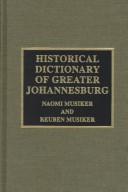
ISBN: 0810835207 Year: 1999 Publisher: Lanham, MD : Scarecrow Press,
Abstract | Keywords | Export | Availability | Bookmark
 Loading...
Loading...Choose an application
- Reference Manager
- EndNote
- RefWorks (Direct export to RefWorks)
Transvaal (afrique du sud) --- Johannesburg (afrique du sud) --- Histoire --- Histoire --- Transvaal (afrique du sud) --- Johannesburg (afrique du sud) --- Histoire --- Dictionnaires --- Histoire --- Dictionnaires
Periodical
Year: 1983 Publisher: Pretoria : The Museum,
Abstract | Keywords | Export | Availability | Bookmark
 Loading...
Loading...Choose an application
- Reference Manager
- EndNote
- RefWorks (Direct export to RefWorks)
Antiquities. --- NATURAL HISTORY - SOUTH AFRICA --- Transvaal (South Africa) --- South Africa --- Antiquities. --- NATURAL HISTORY - SOUTH AFRICA
Book
ISBN: 0869751557 Year: 1983 Publisher: Johannesburg : Ravan Press,
Abstract | Keywords | Export | Availability | Bookmark
 Loading...
Loading...Choose an application
- Reference Manager
- EndNote
- RefWorks (Direct export to RefWorks)
Pedi (African people) --- South Africa --- History. --- Transvaal (South Africa) --- History --- Pedi --- to date
Book
ISBN: 9781781385722 9781846319686 1781385726 1846319684 9781781381038 1781381038 Year: 2013 Publisher: Liverpool : Liverpool University Press,
Abstract | Keywords | Export | Availability | Bookmark
 Loading...
Loading...Choose an application
- Reference Manager
- EndNote
- RefWorks (Direct export to RefWorks)
The experience of the South African War sharpened the desire to commemorate for a number of reasons. An increasingly literate public, a burgeoning populist press, an army reinforced by waves of volunteers and, to contemporaries at least, a shockingly high death toll embedded the war firmly in the national consciousness. In addition, with the fallen buried far from home those left behind required other forms of commemoration. For these reasons, the South African War was an important moment of transition in commemorative practice and foreshadowed the rituals of remembrance that engulfed Britain in the aftermath of the Great War. This work provides the first comprehensive survey of the memorialisation process in Britain in the aftermath of the South African War. The approach goes beyond the simple deconstruction of memorial iconography and, instead, looks at the often tortuous and lengthy gestation of remembrance sites, from the formation of committees to the raising of finance and debates over form. In the process both Edwardian Britain's sense of self and the contested memory of the conflict in South Africa are thrown into relief. In the concluding sections of the book the focus falls on other forms of remembrance sites, namely the multi-volume histories produced by the War Office and The Times, and the seminal television documentaries of Kenneth Griffith. Once again the approach goes beyond simple textual deconstruction to place the sources firmly in their wider context by exploring both production and reception. By uncovering the themes and myths that underpinned these interpretations of the war, shifting patterns in how the war was represented and conceived are revealed.
South African War, 1899-1902. --- Anglo-Boer War, 1899-1902 --- Boer War, 1899-1902 --- Transvaal War, 1899-1902 --- History --- Boer War --- Second Boer War --- South Africa
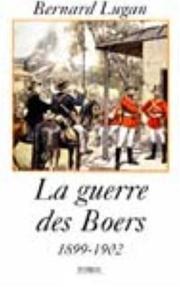
ISBN: 2262007128 9782262007126 Year: 1998 Publisher: Paris : Perrin,
Abstract | Keywords | Export | Availability | Bookmark
 Loading...
Loading...Choose an application
- Reference Manager
- EndNote
- RefWorks (Direct export to RefWorks)
Anglo-Boerenoorlog, 1899-1902 --- Boer War, 1899-1902 --- Boerenoorlog (2de), 1899-1902 --- Guerre des Boers, 1899-1902 --- Guerre du Transvaal, 1899-1902 --- Guerre sud-africaine, 1899-1902 --- South African War, 1899-1902 --- Transvaal War, 1899-1902 --- Transvaalse oorlog (2de), 1899-1902 --- Afrikaners --- Political activity --- History --- Great Britain --- South Africa --- Foreign relations --- Afrikaners - Political activity --- South African War, 1899-1902 - History --- Great Britain - Foreign relations - South Africa --- South Africa - Foreign relations - Great Britain --- AFRIQUE DU SUD --- COLONIALISME --- HISTOIRE --- 19E-20E SIECLES
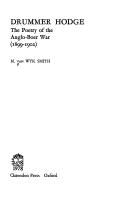
ISBN: 0198120826 9780198120827 Year: 1978 Publisher: Oxford : Clarendon Press,
Abstract | Keywords | Export | Availability | Bookmark
 Loading...
Loading...Choose an application
- Reference Manager
- EndNote
- RefWorks (Direct export to RefWorks)
War poetry --- South African War, 1899-1902 --- History and criticism --- Literature and the war --- Literature and the war. --- History and criticism. --- War --- Poetry --- Anti-war poetry --- Anglo-Boer War, 1899-1902 --- Boer War, 1899-1902 --- Transvaal War, 1899-1902 --- War poetry - History and criticism --- South African War, 1899-1902 - Literature and the war
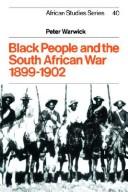
ISBN: 0521252164 0521272246 0511523904 9780521252164 9780511523908 9780521272247 Year: 1983 Volume: 40 Publisher: Cambridge Cambridge University Press
Abstract | Keywords | Export | Availability | Bookmark
 Loading...
Loading...Choose an application
- Reference Manager
- EndNote
- RefWorks (Direct export to RefWorks)
The South African War was a costly and bitterly contested struggle. It was fought in a region populated by five million people, four million of whom were black. This is the first history of the war to focus upon the wartime experiences of black people, and to examine the war in the context of a complex and rapidly changing colonial society increasingly shaped, but not yet transformed, by mining capital. The ways in which the war influenced the lives and livelihoods of different sections of the black population are studied - from chiefs and newspaper editors to peasant farmers and artisans, to farm tenants and industrial workers. Dr Warwick shows that black people were far more than either spectators to, or passive victims of, a white man's quarrel, and presents a thorough revision of accepted views on the war. He reveals the vital roles performed by black people in both the British and Boer armies, and shows how the regular and irregular participation of blacks exercised an influence upon the course of war.
South African War, 1899-1902 --- Blacks --- Participation, Black --- History --- Blacks. --- Participation, Black. --- Arts and Humanities --- South African War, 1899-1902 - Participation, Black --- South African War, 1899-1902 - Blacks --- Blacks - South Africa - History - 19th century --- Blacks - South Africa - History - 20th century --- Black people --- Black people. --- Black persons --- Negroes --- Ethnology --- Anglo-Boer War, 1899-1902 --- Boer War, 1899-1902 --- Transvaal War, 1899-1902
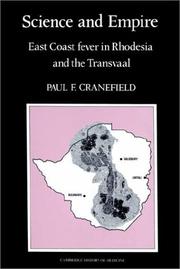
ISBN: 0521392535 9780521392532 0521524490 9780521524490 9780511563676 0511563671 Year: 1991 Publisher: Cambridge Cambridge University Press
Abstract | Keywords | Export | Availability | Bookmark
 Loading...
Loading...Choose an application
- Reference Manager
- EndNote
- RefWorks (Direct export to RefWorks)
East Coast fever is a lethal disease of cattle, caused by a parasite that multiplies within T-lymphocytes, causing them to become lymphoblasts that behave like cells in leukaemia and lymphoma. This is the story of the disease and its effects on farmers, as well as of the scientists who studied it. The disease was unknown to western science or to veterinary practice until it was introduced into Rhodesia in 1901. It devastated the cattle-raising and ox-cart dependent transport systems of Rhodesia and South Africa and was not fully brought under control for some 50 years. The book describes the social and economic impact of the outbreak, the scientific investigations into it, and the effort to control it. The scientific study of the disease was done in part by the famous bacteriologist Robert Koch, whose many early errors had a negative effect on later investigators whose work was far more sound.
East Coast fever --- History --- Theileriasis --- African Coast fever --- Bovine theileriasis --- Bovine theileriosis --- Coastal fever --- East African Coast fever --- Rhodesian tick fever --- Cattle --- Theileriosis --- history --- Infections --- Africa, Southern. --- Zimbabwe. --- Republic of Zimbabwe --- Zimbabwe Rhodesia --- Rhodesia, Southern --- Southern Rhodesia --- Southern Africa --- Arts and Humanities --- History. --- East Coast fever - Zimbabwe - History --- East Coast fever - South Africa - Transvaal - History
Book
ISBN: 9789025369934 9025369936 Year: 2013 Publisher: Amsterdam Athenaeum-Polak & Van Gennep
Abstract | Keywords | Export | Availability | Bookmark
 Loading...
Loading...Choose an application
- Reference Manager
- EndNote
- RefWorks (Direct export to RefWorks)
"Oorsprong van de apartheid. Eerste mediaoorlog. Voorproefje van de Eerste en de Tweede Wereldoorlog. De (Anglo)-Boerenoorlog (1899-1902) behoort tot de meest intrigerende conflicten in de moderne geschiedenis. Het verschil in status tussen supermacht Groot-Brittannie ̈en de twee nietige Boerenrepublieken, bewoond door afstammelingen van Nederlandse kolonisten, was bizar groot. Toch moesten de Britten heel ver gaan om de oorlog te winnen, tot en met systematische terreur tegen de burgerbevolking. Martin Bossenbroek, auteur van historische klassiekers als 'Holland op zijn Breedst' en 'De Meelstreep', vertelt het hele verhaal. Hij verplaatst zich in alle partijen en volgt drie kleurrijke hoofdpersonen op de voet: de Nederlandse jurist Willem Leyds, de Engelse oorlogsverslaggever Winston Churchill en de Boerencommando Deneys Reitz. Nooit eerder werd de Boerenoorlog zo compleet en zo beeldend beschreven"--Provided by publisher.
South African war, 1899-1902 --- 968.0.04 --- 968.0.04 Geschiedenis van Zuid-Afrika: 19de en 20ste eeuw--(1814-1909) --- Geschiedenis van Zuid-Afrika: 19de en 20ste eeuw--(1814-1909) --- South African War, 1899-1902 --- Anglo-Boer War, 1899-1902 --- Boer War, 1899-1902 --- Transvaal War, 1899-1902 --- History of Africa --- anno 1900-1909 --- anno 1800-1899 --- South Africa --- Guerre des Boers (1899-1902) --- Guerre des Boers, 1899-1902. --- South African War, 1899-1902. --- 1899-1902.
| Listing 1 - 10 of 14 | << page >> |
Sort by
|

 Search
Search Feedback
Feedback About UniCat
About UniCat  Help
Help News
News